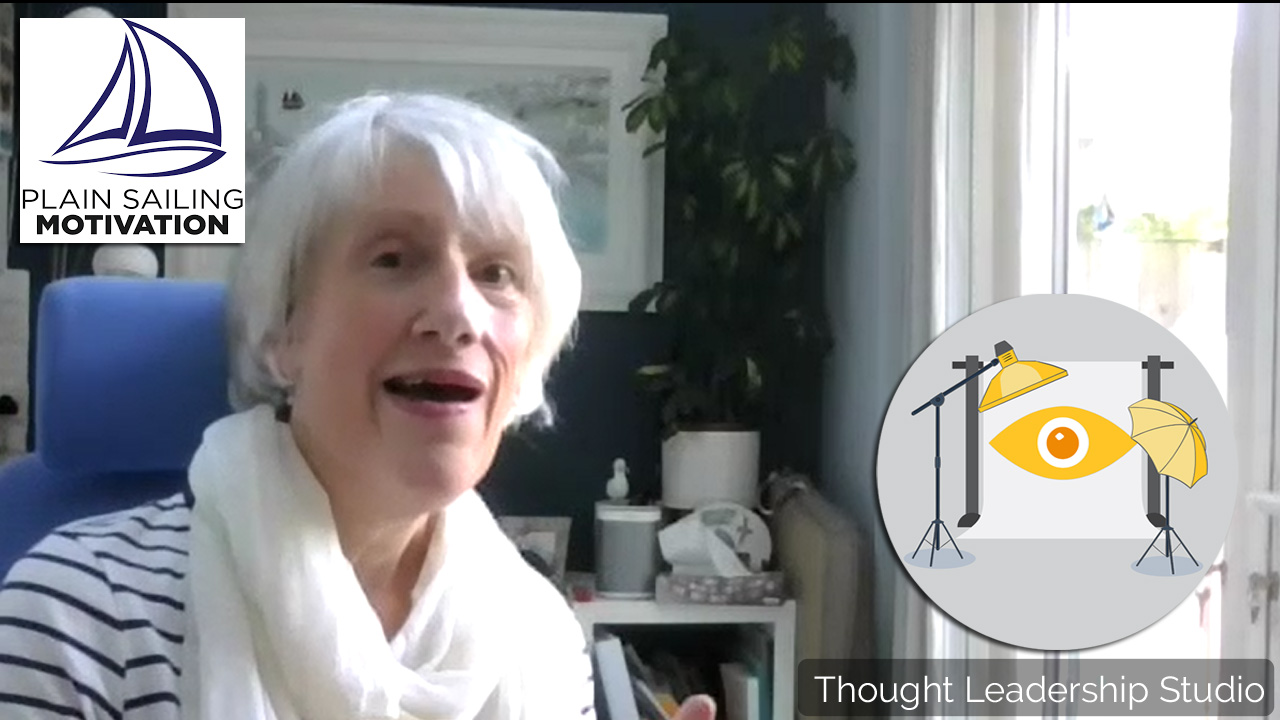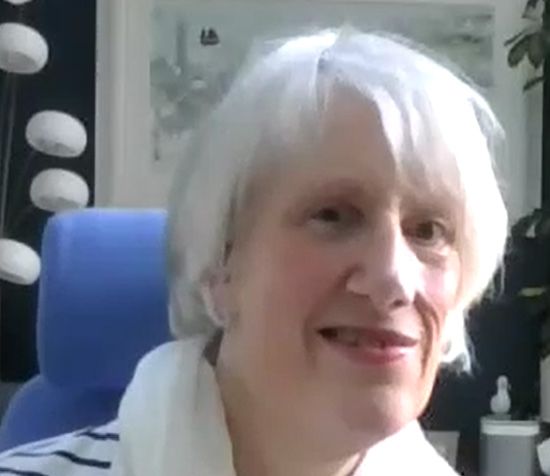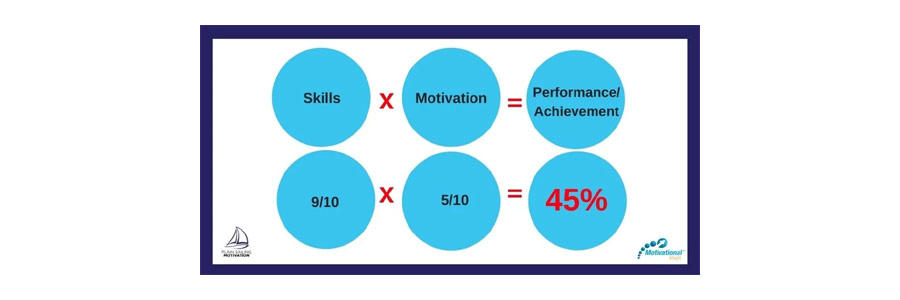Thought Leadership Studio Podcast Episodes:
Accessing and Amplifying Your Motivation with Sarah Stones
Episode 49 Interview with Sarah Stones of Plain Sailing Motivation - Gain Insights into Motivation, Unlock Self-awareness, and Uncover Hidden Potential

#coaching, #consulting, #influence, #insight, #interviews, #mentaltraining, #motivation, #neurolinguisticprogramming, #nlp
Or Click here to listen or subscribe on appWhat this episode will do for you
:- Gain Insights into Motivation: Discover the expertise of Sarah Stones, a coach, motivation specialist, and NLP Master Practitioner, on intrinsic motivation and its impact on personal and organizational success.
- Unlock Self-awareness: Understand the significance of self-awareness and emotional intelligence in identifying what truly motivates you, and how to leverage those factors for peak performance.
- Apply Practical Techniques: Learn practical tools like calibrating your past peak motivation experiences, mind mapping, and gratitude journaling to enhance motivation and create positive change in your life.
- Uncover Hidden Potential: Recognize the power of asking the right questions and working with a coach or consultant to reveal blind spots, tap into hidden potential, and accelerate personal growth.
Sarah Stones.
In this episode, we're excited to introduce Sarah Stones, founder of UK-based Plain Sailing Motivation, coach, motivation specialist, and NLP Master Practitioner.
Some of Sarah's coordinates:
Curated Transcript of Interview with Sarah Stones
The following partial transcript is lightly edited for clarity - the full interview is on audio. Click here to listen.
Chris McNeil: I'm Chris McNeil, with Thought Leadership Studio, and I'm sitting here across the Atlantic with Sarah Stones of Plain Sailing Motivation. And Sarah is a speaker coach, motivation specialist, and NLP Master Practitioner. She worked in HR for over 20 years before setting up her own business in 2015 after overcoming breast cancer and realizing that life is too short to not be doing something you love.
Sarah combines her HR experience and her knowledge of intrinsic motivation, something important to thought leadership, obviously appreciative inquiry in positive psychology with a practical solutions focused approach. And she works with organizations to develop their knowledge of intrinsic motivation, and she's passionate about educating people about motivation. And we're gonna go into a lot of this during our talk. So welcome, Sarah. Glad to be speaking with you.
 Sarah Stones: Lovely to speak to you today, Chris, too.
Sarah Stones: Lovely to speak to you today, Chris, too.
Chris McNeil: Well, we know a little bit about you and the origin of Plain Sailing Motivation, but why don't we start with the inspirational moment. What happened inside of you or outside of you, or a combination that was the trigger that set you in the direction of founding this organization and becoming a motivational specialist?
Sarah Stones: I can tell you exactly the minute. I'd always gone into jobs throughout my career, loved them for the first two years, and then ended up feeling like, oh, was I in the right job? What was happening? And I would think about, am I in the wrong career? And there was a real pattern to this and somebody said to me, let's look at what motivates you. I'm using this new tool called the Motivational Map.
The Right Fuel for the Car
And when I read that my report, all the light bulbs went off because it suddenly made sense of this pattern throughout my career, and knowing that actually for the first two years in a role, my need to make a difference, which is one of my key motivators and might also need to be thinking of creative solutions and problem solving, that was always met within the first two years.
 And then I would reach this stage where I was, what I now recognize, I was bored. And so, and over the years I've done lots of personality profiles. I use lots of different tools in my HR career, but nobody had talked to me about, let's think about what motivates you, what gives you the energy? And we like cars, really, if you took a brand new car to the garage to fill it up with fuel, but you didn't know which fuel to put in it, you wouldn't go very far, would you?
And then I would reach this stage where I was, what I now recognize, I was bored. And so, and over the years I've done lots of personality profiles. I use lots of different tools in my HR career, but nobody had talked to me about, let's think about what motivates you, what gives you the energy? And we like cars, really, if you took a brand new car to the garage to fill it up with fuel, but you didn't know which fuel to put in it, you wouldn't go very far, would you?
Chris McNeil: Right. And so it's the discovery, the insight of the factors that brought out the best in you, that led to a highly motivated state making a difference being one of those. And and that enabled you to re-engineer your life to put those factors around you.
Sarah Stones: Exactly. And I realized that actually I didn't know much about motivation, and that was eight years ago. So actually since then, it's been developing my expertise in this area and sharing it with others and seeing what a huge impact it makes in so many different areas of life, whether it's supporting our sales teams or whether it's supporting ourselves or our teams or our organizations.
Chris McNeil: So I am thinking about the listener who might be wondering, "So what does this mean to me?"
Obviously I'd like to be more motivated, we would all like to be highly motivated and focus that motivation on a direct that's meaningful to us. So where we're going or where we're moving away from - both propel us along a path that has meaning to us and the use of tools like this questionnaire like you had me do - which I thought was really interesting - is one way to start to maybe discover things that were unconscious before and make them conscious so you can utilize those and organize them to make your life more effective.
Models of Motivation
Sarah Stones: Yeah. We talk about this. So we can either use the tool, which is amazing, and you saw it just takes 10 minutes to fill it in. But actually if we look at the different motivators ... so Dan Pink in his work, he brought out three main motivator, which were autonomy purpose, and mastery. But the model, which I think is more accurate actually identifies nine motivators. So there's another six on top of those three that Dan Pink identified.
And I think when we are thinking about what people need to give them energy ... most organizations, I was reading an article only yesterday about with people resigning so much at the moment, organizations are making counter-offers in terms of increased salary. And while we know that is important, particularly with the cost of living as it's at the moment, it's very rare that the money is one of our key motivators. It's important and we've got to acknowledge that.
But there's other things that I think we're missing the trick. If we are not looking at can we increase, give this some person more opportunity to be involved in problem solving, can we give them more freedom and independence? Do they, are people leaving because they are missing out on those really important relationships at work? Some people go to work to get the job done, but for some people, those relationships are so important and those are just three of another three of the motivators.
Chris McNeil: That's such an interesting insight. And I remember a study that supports that - that when you ask people what they thought motivated others in a job, money was the top. But when you ask people what motivates you, it was like number six.
 Not that money's not important. And certainly the lack of money is, or being underpaid can be extremely demotivating. But once it's fair, then there's so many other factors. And I understand sometimes the system conditions of organizations can block things like autonomy and self-actualization and relationships.
Not that money's not important. And certainly the lack of money is, or being underpaid can be extremely demotivating. But once it's fair, then there's so many other factors. And I understand sometimes the system conditions of organizations can block things like autonomy and self-actualization and relationships.
Sarah Stones: And I often talk so on with my career coaching, sometimes it's not possible for people to move to a new organization at that current time, but we talk about job crafting. So taking that responsibility on and thinking actually the, the organization maybe isn't meeting all of my motivators, but actually how can I do that myself?
Chris McNeil: So even if the organization's environment doesn't support it, of course we have some level of control over organizing our work within that It's just my organizational development brain jumps right to "wow, if we could just remove all the things that block self-actualization and productivity can leap up."
But that's sometimes counterintuitive to top-down thinking - and organizational command and control type thinking that has a fear of giving people too much autonomy. But don't your customers want to work with highly motivated people who enjoy their jobs? Doesn't that show in your customer service?
Skills X Motivation = Performance/Achievement
Sarah Stones: Completely? When we look at ... there's a lovely graphic that I've got that shows we can have all of the skills. So if we had nine out 10 of all the skills that we needed, but if we're only five out of 10 on our level of motivation, the impact on our performance and our achievement is tremendous. So even just putting, pushing that motivation up by two or three points can make a huge difference to the performance overall of the organization.
But also the other thing about that, and something that's really important to me is to think about our mental health and wellbeing. And I don't know about in the States, I'm assuming that it's very similar over there to the UK in that actually it's a real issue at the moment. And I have yet to meet anybody with a high level of motivation and a low level of mental health and wellbeing. So if we are supporting somebody's motivation by default we're supporting their mental health and wellbeing.

Chris McNeil: So how would you contrast someone who's a 10 on motivation with someone in the same role who's more like a five? What are the differences that you would see if you were observing this person doing their work or going about their life that would lead you to save their of 10 on motivation versus a five? How would you know that?
Sarah Stones: Good question. And actually sometimes you wouldn't be able to see that, which is why when I'm working with clients, I use this tool because lots of people, we just don't see what's going on below. It's a bit like another iceberg, isn't it? We see that top little bit, but we don't see all the stuff that's beneath the surface.
Chris McNeil: So some of it you could see, but a lot of it is beneath the surface. But questions could elicit answers. What kind of, what kind of questions would delineate between a five or a 10 on motivation?
Sarah Stones: I think we spoke earlier about NLP. And I think when you got some of this emotional intelligence skills so important for leadership I think you can see, and it's about asking the right questions, isn't it?
 What I wouldn't say is that there are magic questions, because it's a bit like in coaching someone will say, oh, what's the best coaching question? Or, well, actually the right coaching question in the right place can be any number of questions. It's being aware of where that other person needs. I'm just asking the question that is right in that moment.
What I wouldn't say is that there are magic questions, because it's a bit like in coaching someone will say, oh, what's the best coaching question? Or, well, actually the right coaching question in the right place can be any number of questions. It's being aware of where that other person needs. I'm just asking the question that is right in that moment.
Chris McNeil: Isn't that the value of a coach or a consultant who has both a large toolkit of questions to ask and also the awareness and experience to see blind spots?
Sarah Stones: Yeah.
Chris McNeil: And seeing those blind spots in asking the right questions might fold time for this individual and save them years of trial and error experience of getting to the same place. And something that I've used - and I've worked with sports psychology a good bit. I actually worked with a sports psychologist who had trained with two US Olympic teams - so he was high up and he was familiar with NLP, he was trained in Ericksonian and hypnotherapy, which is a lot of where NLP comes from.
And we talked about the use of scales of, of calibrating by asking when was a time you were highly motivation ... Because most people have had experience, even if they're not highly motivated now, sometime in their life, they've had an experience with, they're really motivated, they're in the zone, they're focused, they're highly energized, they feel a lot of meaning in what they're doing.
They're very immersed in it and in enjoying the process while working at peak effort, that kind of, that Zen state of effortless effort of being in the zone or in the flow state, so to speak. So the kind of questionnaire would have people calibrate and think, well, think of a time you're at a 10, or even if you don't think you've ever been at a 10, call it an 8. And contrast that when times you were less motivated.
And the sports psychologist actually had a visualization exercise of imagining a scale and I use for weight training and I turn the scale up to a 10 to do a heavy set of squats. And I feel my focus narrowing and my energy rising up and my muscles tensing until I was just like a peak of energy that I would put into that set, but then turn it back down to relax and recover more quickly after that. So what do you think about the use of self-referencing from someone's life experience, their personal history to discover times when they were highly motivated and learn from those times?
Sarah Stones: Yeah, I know why we can use that with clients because we tend to, we go through life, don't we? And we forget about those peak moments. And if think about what was going on and actually let's break that down and think about what, so when we've got the picture in our mind and the feeling of what was going on, let's really look at, okay, so what, what created that picture and that feeling? And then can we use the things that created that in going forward and supporting our current motivation?
Mind Mapping and Journaling Personal Peak Experiences
Chris McNeil: So remembering your personal peak experiences of motivation, making an inventory, which I imagine like in mind mapping exercise might work well for that. Or you just do a mind map of what's going on, what you were thinking and what you're feeling, what was going on in your life. Maybe you had a coach at that time or maybe you had a certain goal that you're working for and just mind map it out and maybe doing several different ones so you can look for what's common and consistent in your different peak experiences ... Something like that.
Sarah Stones: Yeah. And journaling can really help because I think if we think about what a strain does, I mean when we think about it, we plug our phone in every evening, don't we? Right. We, we are just like phones. We need to be filling ourselves with the right sort of energy the same as our cars. And actually if we know that being with other people is really important for us and maybe we're still working from home, let's make sure that we get out and we meet other people. Even if it's just going to the local for some milk and making sure that we are talking to the people rather than just going in and buying it and leaving.
Let's just think about what we can do each day. Just say that those different motivators can be met. And I think your, what you've just said about being able to identify them is so important.
Chris McNeil: Yeah. I'm a habitual journaler. I have been my whole adult life. It's both in my conscious life and there's times I've used dream journaling too. I think we can learn a lot from the metaphorical language of the unconscious mind and how it communicates to us in dreams through journaling as well. I don't always do that, but sometimes I do.
And it's always been really valuable because when you look back and you see patterns or you have a, a stage in your life where you're really, you're being a peak performer and everything's flowing and all those things you work for are coming, your dreams are coming to life and you're bringing them to life and enjoying that. You may not be as conscious in the moment of all the things that helped you did to bring that about without the journaling to remind you of that.
Training Your Brain for Gratitude
Sarah Stones: Yeah. It's journaling and I positive psychology so important as well. Martin Seligman's work on the PERMA model and one of the key things from that is the keeping the gratitude diary. Writing down three things every day that have made you smile that you are grateful for. And the science behind that.
 It shows that if you've done that for 30 days, the benefit of that lasts for three months. And it's all about training our brains to look out for those positive experiences. So it could be seen a daffodil out in spring, it could be just hearing a child's laughter. It could be something that's really important to you, but it doesn't have to be huge events. It's just small once. And you can do that in a online or in a book. I like to keep a book by the side of my bed, because every time you pick it up you tend to flick through other pages. So when every, our brains don't know the difference between imagination and reality. Do they?
It shows that if you've done that for 30 days, the benefit of that lasts for three months. And it's all about training our brains to look out for those positive experiences. So it could be seen a daffodil out in spring, it could be just hearing a child's laughter. It could be something that's really important to you, but it doesn't have to be huge events. It's just small once. And you can do that in a online or in a book. I like to keep a book by the side of my bed, because every time you pick it up you tend to flick through other pages. So when every, our brains don't know the difference between imagination and reality. Do they?
Chris McNeil: Right.
Sarah Stones: So every time you read something in your book that's made you smile on another day, you are getting that extra hit of dopamine and serotonin
Chris McNeil: That makes sense - and from a couple of points of view. And one might be, I like the act of physically writing it even though it's convenient. And I use a computer for most things. I use a stylist with the computer for journaling and do it in handwriting because it becomes a kinesthetic anchor to that sense of gratitude that you can tap into and draw from.
And another thing I'm getting is just the act of training your mind to put aside the filters to the things that we appreciate in life maybe also opens you up so that you are just more in a state of receiving the goodness of life continuously.
Sarah Stones: Yeah, completely. It's really interesting. So before Seligman started studying what we need for a positive mental health, the only studies that had ever taken place were about poor mental health. And he's identified the positive emotions, engagement relationships, meaning and achievement are the five elements of his PERMA model. And it fits so well with motivation because it's all about giving us energy and supporting ourselves to, to be in a positive mindset.
Chris McNeil: That's excellent. And these, I'm speaking to the listener now. These are references that I will link to on the episode page. So if you're listening to this on an app, there's a link to the episode page where I'll link to Sarah's resources as well as some of these references in positive psychology, NLP, motivation that we're talking about.
And Sarah, that's one of the things that attracted me to the sports psychology aspect of psychology because it was about not just fixing what was broken, but extending human performance, tapping into untapped potential and finding out how high is high, how far can we go? And you, the mind is so malleable when you apply mental training. It seems like the sky's the limit. But that was different. And that's one of the things that also, like you have got into the field of NLP, which one of the things that Richard Bandler told us was that psychology was that the time just studying what was broken. And all that can tell you is how to recreate that state of being broken.
Instead, study the people who used to be broken and got better and find out that pattern or the patterns of high achievers of people who can continuously replicate the kinds of states of excellence that we're talking about. Because excellence is a state of consciousness and we've all had times in our lives where we felt that excellent state, that flow state - a state of high expectation of success and immersion in something contributing to something meaningful that we're working to accomplish. And the joy that comes with that.
And because we've experienced it once, if we discovered a formula with things like these tests, you're talking about the right questions, the right analysis to recreate these scenarios that are triggers for our own excellence states or whatever we would call those, then we can have those more consistently. And so every day becomes more like your best day. Is that kind of where we're going?
Sarah Stones: Completely. And that's why I also love appreciative in inquiry. So appreciative inquiry is looking at what's good and taking what's really working from that and applying it to other parts of our work rather than focusing on ... so for example, if someone's not doing a a good job, we send them on a training course, well why don't we look at what they are good at and let them do more of that. And so, and actually that's likely to be something that motivates them.
And then actually let's get someone else in the team who's much better at this other thing and let them do it. Let's work out and use all of our strengths and appreciative inquiries. Let's look at what's going well within an organization and let's really dig down into how that is working well. And then let's take that and apply it to areas of the organization where we need to make improvements.
Chris McNeil: That's awesome. And Peter Drucker, the management thinker and writer would agree with that because I remember in his writings he talked so much about building on strength and the purpose of a team was to make individual weaknesses redundant because you're building on each person's strength and create a symbiotic team. So your business has all the strengths it needs.
***************************************
The transcript is lightly edited for clarity and is a partial transcript- the full interview is on audio. Click here to listen.
***************************************
Free Stuff and Offers Mentioned in Podcast
***************************************
***************************************